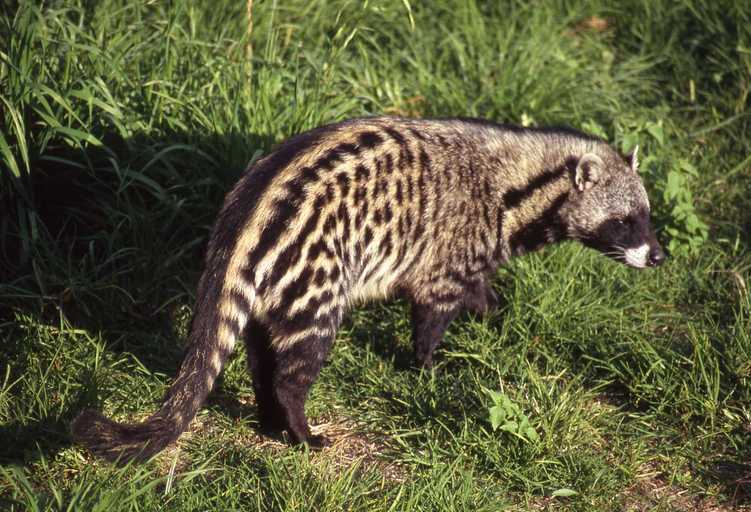
After COVID lockdown, rare civet, other animals explore deserted streets
With humans under lockdown, many wild animals, including the endangered species, have reclaimed spaces with some being spotted on the deserted streets at several places in the country, the images of which are widely shared on social networking sites.

With humans under lockdown, many wild animals, including the endangered species, have reclaimed spaces with some being spotted on the deserted streets at several places in the country, the images of which are widely shared on social networking sites.
India is under the biggest lockdown with around 1.3 billion people asked to stay home in view of the coronavirus outbreak, which has claimed 19 lives and infected over 800 people in the country.
In a feel-good video, Indian Forest Service (IFS) officials shared videos of wild animals, including the critically endangered Malabar large-spotted civet which was last seen in 1990, taking over the streets in absence of human interference.
This is a Small Indian Civet. Things which I can confirm; Video is real (not animation). Was never posted before Wednesday on Internet. Sources say it is from Kozhikode. It looks sick. Quite possible was in captive & released. It is found there normally also. That’s it. https://t.co/5ginqdxxJx
— Parveen Kaswan, IFS (@ParveenKaswan) March 27, 2020
IFS officer Sushant Nanda shared a video of the Malabar large-spotted civet roaming on the streets of Kozhikode in Kerala.
“Now its turn of the Malabar large spotted civet on the road. Critically endangered with fewer than 250 matured individuals. Endemic to western ghats, not seen since 1990 surfaced at Kozhikode during present lockdown,” he said in a tweet accompanying the video.
In another tweet, he shared a photo from Noida Sector 38 in which a Nilgai (blue bull) can be seen roaming on the streets.
Friends I really like to see Nature reclaiming the old territory. And also appreciate people’s new love for nature in times of CoronaVirus.
– Sambar are in good numbers in Chandigarh
– Nil Gai are very much in NoidaBoth from long. Both cities has seen a lot of accidents also. https://t.co/XflZySiIfX
— Parveen Kaswan, IFS (@ParveenKaswan) March 27, 2020
The officer also shared a video showing a Chital (spotted deer) running on the lanes of Dehradun.
Here is Spotted Deer( Chital) on the lanes of Dehradun. Nature reclaiming thick and fast?? https://t.co/LtvBTMztXD
— Susanta Nanda IFS (@susantananda3) March 27, 2020
Another IFS officer Parveen Kaswan tweeted a video in which sambar deer could be seen on the streets of Chandigarh.
Mass nesting of endangered olive ridleys at the Rushikulya River mouth in Odisha was another such rare sight. Forest officials found an extremely rare albino turtle there.
Here I narrate phenomenon of mass nesting. Which I observed in middle of a night at a remote island. ???? https://t.co/wKezN30Gum
— Parveen Kaswan, IFS (@ParveenKaswan) March 27, 2020
Nanda shared the video with the caption, “Arribada (mass nesting) of Olive Turtles are almost over off the coast of Odisha. 10000+ were recorded tonight (March 26). It will now be sporadic. It was bit late this time. Happened during daylight at Rushikulya mouth, after 2015. An Albino was recorded by the staff for the first time”.
Animal rights activist Gauri Mulekhi said the COVID spell has demonstrated how nature can rebound and flourish in the absence of human interference.
“We have pushed the boundaries of nature and cornered wildlife to near extinction over decades of industrialisation and urbanisation. The COVID spell has demonstrated how nature can rebound and flourish in the absence of human interference. Even in the urban areas, it is heartening to hear and see all kinds of birds and small mammals making an appearance,” she told PTI.
Related news: In Chennai, you may meet ‘coronavirus’ cop on road if you violate lockdown
“A big lesson to learn is to stop worldwide deforestation, minimise consumption and thereby industrialisation and take a step back to a global lifestyle more aligned with nature,” she added.
Previously, Bollywood actress Juhi Chawala too tweeted about the rare sighting of dolphins near Marine drive, Mumbai shore.
Look at this … dolphins just off marine drive ..!!!! Isn’t it Ammaazzinnggg … ? pic.twitter.com/ECV2V5VxRU
— Juhi Chawla (@iam_juhi) March 28, 2020


